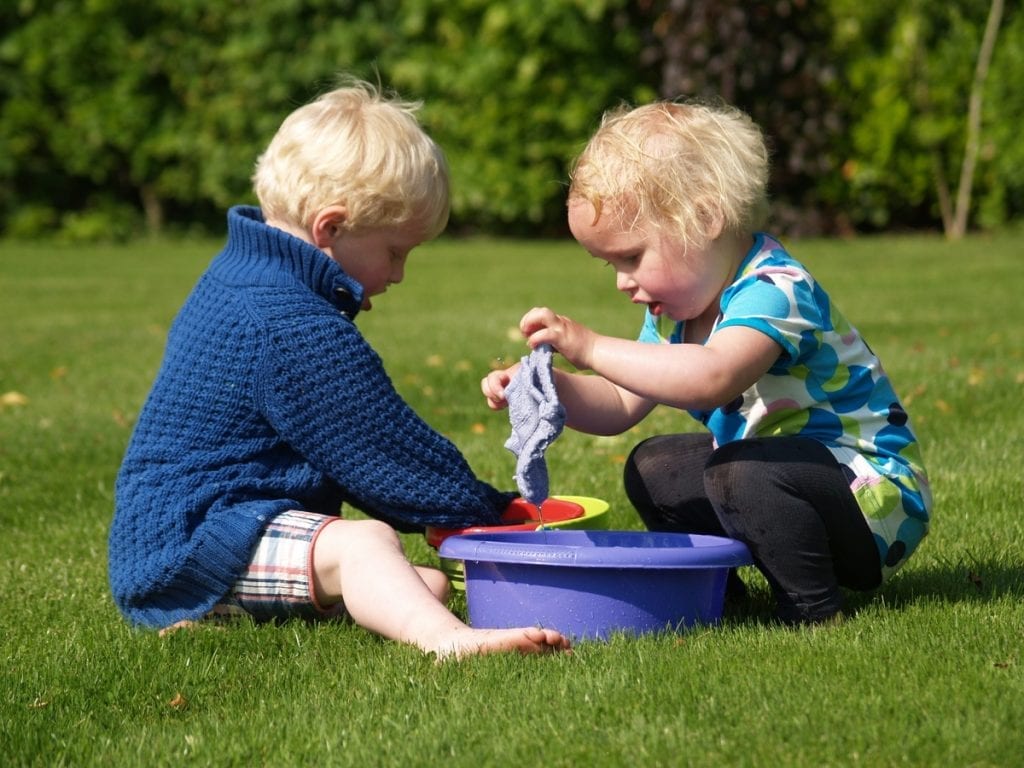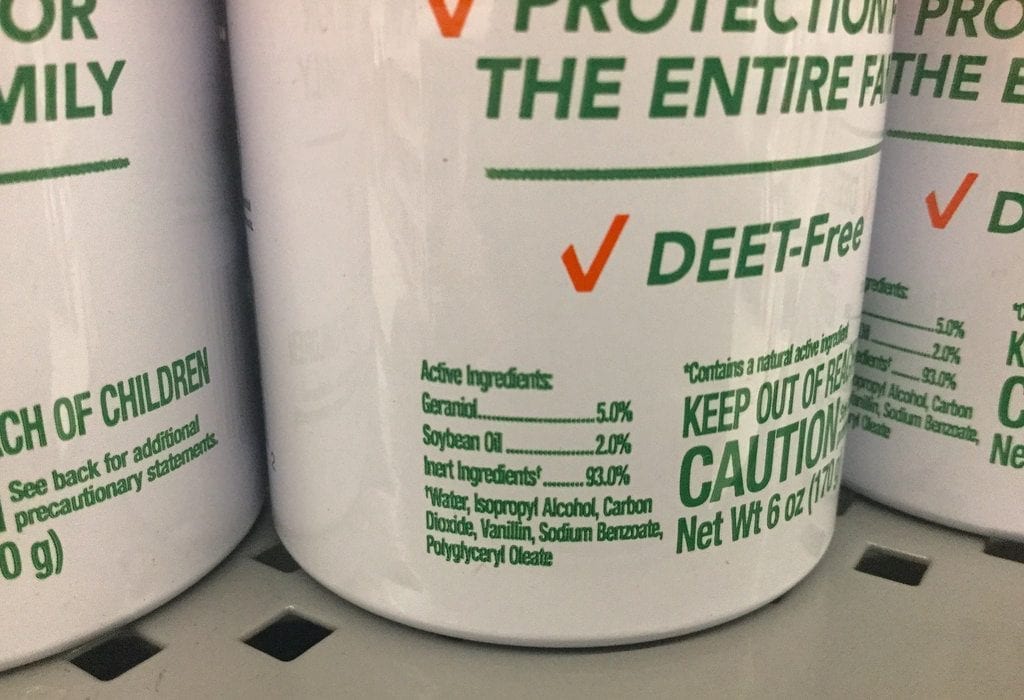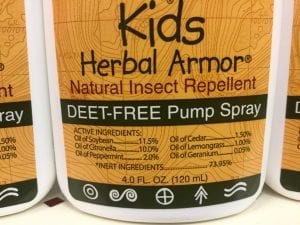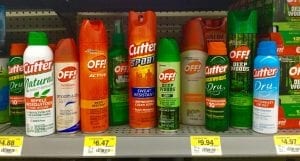What Are The Best Bug Sprays? When you live in the countryside, it is impossible to stop your kids from playing outside all the time. They may want to sort rocks, roll on the grass, or inspect various florae at a site outside of the house for hours.

If there are other toddlers their age in the neighborhood, they might run around the field or play different outdoor activities with them.
Although letting your kids enjoy and explore things outside your home is excellent for their cognitive and sensory development, you should realize that the green setting makes them susceptible to mosquito bites and potential exposure to insect-borne diseases, including insect borne illnesses or other serious illnesses. Mosquitoes tend to breed in stagnant water, which can be found in an empty flower pot or a shallow hole in the ground. Ticks, on the other hand, love staying on shrubs and bushes, and these creepy-crawlies are abundant in abandoned sites. It’s important to take precautions and use effective insect spray repellent chemicals to protect your children from insect bites and reduce the risk of insect borne illness, tick borne illnesses, insect borne disease and lyme disease.
If you want to preventing mosquito bites for your child, you should learn how to pick the top bug spray for kids
The Best Bug Spray For Your Kids
1. Find Product With Less Than 30% Deet
N, N-Diethyl-meta-toluamide, which is more commonly abbreviated as DEET, is a chemical spray repellent that you will see in most insect-repelling products in the market. It is very useful when it comes to making the bugs dizzy with its strong smell. Hence, instead of trying to suck the blood out of your child’s skin, they tend to fly away as fast as possible.

Despite DEET’s efficiency at higher concentration, though, the American Academy of Pediatrics (AAP) says that kids only need less than 30% of this ingredient in a bug spray for kids. That percentage is excellent enough for five hours of insect protection. If it exceeds that number, it may become dangerous for the child.
2. Check Picaridin In The Ingredients
One alternative to – or a great combo with – DEET is picaridin, a chemical compound found in many safe bug spray. Picaridin may have greater effectiveness and is considered safer to use for children than the former spray chemicals. You see, this particular active ingredient does not give off a foul odor that the kids might inhale. It does not come from plastic materials as well; that’s why it is practically more eco-friendly compared to DEET. This is a great criterion for choosing the best bug repellent spray bottle for kids.
The reason for picaridin not being much popular than N, N-Diethyl-meta-toluamide is that there are already a lot of studies related to the latter. Nevertheless, you pretty much need up to 10% of picaridin in the top insect spray for kids for it to work for eight hours at maximum.
3. Scatter With Citronella, Oil Of Lemon Eucalyptus Or Catnip Oil
Considering you mostly believe in organic stuff and do not want synthetic compounds touching your children’s exposed skin and possibly irritating their sensitive skin or entering their bloodstream, you can look for the best mosquito spray, such as essential oils and soybean oil as active ingredients. Many plants have natural properties that can repel mosquitoes and also repel bugs, after all. With the right formulation, the effect of the solution can be as strong as the ones created in the laboratory.
Take note that among all the plants you can extract essential oils from, citronella and catnip have the record at deterring bugs and keeping deter bugs from the skin. The only downside here is that you’ll have to re-apply the spray repellent more often than with DEET- or picaridin-filled solutions.

Take note that among all the plants you can extract essential oils from, citronella and catnip have the record at shielding someone from ticks and mosquitoes. The only downside here is that you’ll have to re-apply the repellant more than what you do with DEET- or picaridin-filled solvents.
To Sum Things Up
The best mosquito spray repellent pattern for kids, to be honest, is something that can keep the insects away from the kids for hours. In a country that prioritizes safety, the mosquito spray repellent like repellent felt should also not be harmful to the kids’ health because you can’t know then what’s worse: having your child bitten by a mosquito or allowing him or her to experience side effects from the chemicals in the product. You may choose natural disinfectants, for sure, but you have to research the effectivity of each ingredient composing the best spray for kids.

Once you manage to consider everything mentioned above, you will undoubtedly be able to find the right bug spray for your kids.
Frequently Asked Questions
What Kind Of Bug Spray Is Best And Safe For Kids?
Studies claim that bug spray repellents for kids that contain DEET are safe for kids younger than two months. Bug repellents containing DEET are sold at different strengths. Some bug repellents have 30% DEET, while others have 40% to 50%. However, this doesn’t mean that the higher the concentration in the bug repellents, the stronger it is. It only means that the substance lasts longer.
Is DEET Safe For Kids?
Studies and clinical trials have proven that DEET, the active ingredient found in many safe bug repellents, is safe to use for kids that are two months and above. But the prescribed amount of DEET is limited to a range between 10% and 30% concentration in the repellant. A lower concentration is recommended, especially for kids who will be outdoors for just one or two hours.
What Are The Best Insect Repellents For Children?
According to Verywellfamily, the overall insect repellent for kids is OFF! FamilyCare Insect Repellent. OFF has a powder-dry finish that doesn’t leave the skin greasy or oily. It repels biting flies, sand flies, ticks, fleas, chiggers, and of course, mosquitoes. And because it is in the form of an aerosol repellent, it can easily be applied in a sweeping motion. Another excellent DEET-free repellent is REPEL Plant-Based Oil Of Lemon Eucalyptus insect repellent, which is derived from natural ingredients. Additionally, for the convenience of wipes, Cutter All Family Mosquito Wipes are recommended as an effective repellent option.
What Are The Negative Effects Of Using DEET?
People who have tried leaving products with DEET on their skin for long periods claim to have seen rashes, swelling, skin irritation, and redness. Kids and teens who have accidentally swallowed products having DEET reported experiencing vomiting, nausea, and stomach problems. Seizures are also a rare negative side effect of prolonged DEET exposure.
Is DEET The Same As DDT?
No, it’s not. To simply explain, DEET is a popular substance mixed with insect repellent that is safe to use on clothing and skin. However, it’s important to note that DEET is not typically used to treat clothing directly. Instead, there are specific insect repellents designed for treating clothing, often containing a different active ingredient, such as permethrin. Permethrin-treated clothing provides an additional layer of protection against insects, including mosquitoes and ticks. DDT, on the other hand, was previously used in the agricultural area to eliminate mosquitoes. Still, it was later banned because of its toxic effects and its long-term negative impact on the global food chain.
Can You Put Insect Repellent On A 2-Year-Old?
Yes, best insect sprays can be safely applied to 2-year-olds. The Centers for Disease Control recommends the use of insect sprays on children two months and above. You can use insect sprays on these ages provided that the DEET contained in the repellant sprays do not exceed 30%.
Is Citronella Best And Safe For Kids?
Generally, kids are mostly irritated skin with pesticides. Citronella, when applied on the skin, may cause skin rashes or allergic reaction on some kids and even adults. Thus, some products with citronella oil are not allowed to be used on kids that are less than six months old. Or better yet, consult your doctor about this.
Do Bug Bracelets Work?
Wrist bands and bracelets with citronella and other botanical products do not provide best outdoor gear protection from mosquitoes. This means that wearing bracelets do not guarantee whole body protection from mosquitoes and other insects. On the other hand, those that contain DEET do provide some amount of mosquito protection.
Is Baby Oil The Best Bug Repellent For Kids?
Mineral oils like baby oil are great moisturizers for babies and adults. Parents love baby oils that have synthetic fragrances because they use it to massage their babies at night before they sleep. The creamy-type baby oils are not promoted as insect repellents by the company Johnson & Johnson, but several people who have tried using it as one claim that they effectively get rid of mosquitoes.
How Effective Is The Best DEET Against Mosquitoes?
Bug sprays containing DEET are very effective in ‘repelling’ or driving mosquitoes away from a person’s body. They do not ‘kill’ mosquitoes and other biting insects. DEET does this by interfering with receptors and neurons that are found on the mosquitoes’ mouth and antennae – parts that sense carbon dioxide and lactic acid.
Is Baygon Repellent Best For Babies?
Baygon is an insect repellent product that contains chemicals such as pyrethroids. While pyrethroids are generally considered safe for use on adults and older children, they should be used with caution on babies and infants. It is recommended to avoid repellents such as using Baygon or any insect repellent containing pyrethroids on babies under 2 months of age. For infants older than 2 months, it is advisable to consult with a pediatrician before using any insect repellent. Pediatricians may recommend alternative methods of mosquito protection, such as using physical barriers like mosquito nets, keeping the baby’s environment clean and free of standing water, and dressing the baby in appropriate clothing to minimize exposure to insects. Ensuring the safety of babies is of utmost importance, and seeking professional medical advice is always recommended when using any product on young children.
Is Jungle Juice Insect Repellent Best And Safe For Kids?
Jungle Juice is an insect repellent that typically contains the active ingredient DEET. DEET is considered safe for use on children when applied according to the product instructions and in appropriate concentrations. The American Academy of Pediatrics (AAP) recommends using insect repellents with a DEET concentrations of 30% or less on children over 2 months of age. It is important to apply the repellent sparingly and avoid applying it to the child’s hands, eyes, mouth, and irritated or broken skin. It is also advisable to wash off the repellent once the child is no longer exposed to insects. As with any combination products, it is best to read and follow the instructions provided by the manufacturer and consult with a healthcare professional if you have specific concerns or if your child has any allergies or sensitivities.
Which Mosquito Repellent Is Best For Kids?
When it comes to choosing a mosquito repellent for kids, it is generally recommended to opt for products that are specifically formulated for use on children. The American Academy of Pediatrics (AAP) suggests using repellents containing either DEET, picaridin, or IR3535, as these ingredients have been extensively tested and found to be effective in repelling mosquitoes. The AAP advises using repellents with a DEET concentration of 30% or less on children, and for children under 2 months of age, it is recommended to use mosquito netting and protective clothing as the primary form of protection. It’s essential to carefully read and follow the instructions provided on the product label and avoid applying bug repellent to the child’s hands, eyes, mouth, and irritated or broken skin. If you have any concerns or specific considerations, consulting with a pediatrician would be beneficial in choosing the most appropriate mosquito repellent for your child.
What Are Best Natural Insect Repellents?
Best natural insect spray repellents for children are a popular choice for parents who prefer to avoid chemical-based products. Some commonly used natural spray repellents include natural oils, citronella oil, peppermint oil, lemon eucalyptus oil, lemongrass oil and essential oils such as lavender, peppermint, and lemongrass. These natural products work by masking the scent that attract bugs and mosquitoes and other insects. However, it’s important to note that while natural repellents can be effective, their protection may not last as long as chemical-based repellents like DEET. Additionally, it’s crucial to use natural spray repellents according to the instructions provided and be aware of any potential allergic reactions or skin sensitivities. It’s always recommended to consult with a pediatrician before using any natural insect spray repellent on children, especially infants or those with specific health conditions or allergies
How Can I Protect My Baby From Insects?
To protect your baby from bugs, there are several measures you can take. Firstly, you can use physical barriers such as mosquito nets or screens on windows and doors to prevent insects from entering your baby’s sleeping area. Dress your baby in lightweight, long sleeves clothing and long pants to minimize exposed skin. Avoid areas with high insect activity, especially during peak times such as dawn and dusk. If necessary, use insect spray specifically formulated for infants and children, following the instructions carefully. Choose spray repellents containing ingredients like DEET, picaridin, or IR3535, as they have been proven effective in spray bugs. However, avoid applying spray repellent to your baby’s hands, eyes, mouth, and irritated or broken skin, it might also irritate eyes when applying. Additionally, keeping the surrounding environment clean, removing standing water, and avoiding scented products can help reduce the attraction of bugs. Consulting with a pediatrician is always recommended for personalized advice and guidance on insect protection for your baby.
Best Bug Spray For Your Kids Other Resources:
https://www.thebump.com/a/best-mosquito-repellent
https://www.verywellfamily.com/best-bug-sprays-for-kids-4685010
https://www.goodhousekeeping.com/childrens-products/g32269687/best-bug-sprays-for-babies-kids/
Last Updated on April 13, 2023 by Allen Laconsay
DISCLAIMER (IMPORTANT): This information (including all text, images, audio, or other formats on FamilyHype.com) is not intended to be a substitute for informed professional advice, diagnosis, endorsement or treatment. You should not take any action or avoid taking action without consulting a qualified professional. Always seek the advice of your physician or other qualified health provider with any questions about medical conditions. Do not disregard professional medical advice or delay seeking advice or treatment because of something you have read here a FamilyHype.com.